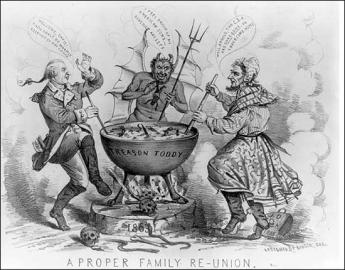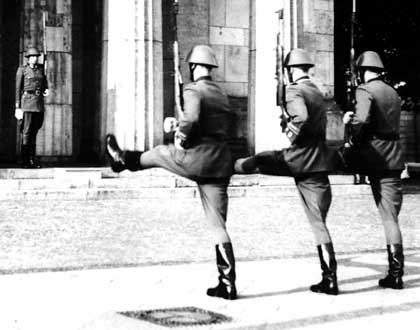Related Topics
No topics are associated with this blog
U.S. and E.U. Exchange Experiences (4)

|
| Political Cartoon |
Western civilization now takes One-man, One-vote for granted in any variant of national governance, and a good thing, too. The Romans modified ancient Greek democracy models into a Republic, allowing slightly modified democracy to become practical for larger governments. Citizens elect representatives, and it is possible to imagine groups of representatives electing their own representatives to higher bodies, and so on, up to the line. As long as democracy remains inflexibly the model for a united Europe, other mechanisms must be adjusted for the obvious inequalities of huge population masses. Since money is the main means of exchange in national systems of compromises, it is a handicap for them to freeze a monetary system in place before governance negotiations have even begun. As a reminder of the American experience, remember that in 1787 Virginia was by far the largest and richest state, not at all the case at present. Indeed, the political landscape then consisted of nine small states ranged against four big ones. Virginia, Pennsylvania, and Massachusetts are no longer considered big states, and New York is fast receding from the top tier. Organizing monetary structures around the size can prove crippling to future designs of unified government, particularly if sufficient time elapses between the two steps. At the very least, leisureliness creates an opportunity to cloak opposition to unification within delaying tactics, presenting arguments to "wait and see" how the monetary system works. At worst, it creates an incentive to make certain the monetary system will not work.

|
| Bitting Gold Coin |
However, a bridge player must play the cards as they are dealt with him, and Europe has decided on a piecemeal approach to organizing an eventual political union. The first step of monetary union is in its tenth year, and in deep trouble. Therefore, a new alternative to be considered is whether to have a monetary union without a government to oversee it. Since the Spanish doubloon was for centuries the medium of maritime exchange for the whole western world, it can be done. The doubloon was a gold coin worth its weight in gold, the so-called "piece of eight". Since that kind of money proved entirely workable, the issue of feasibility is one of backing for the currency. When gold from the New World ran low, it was hard to support a growing world economy with a shrinking currency; the price of everything went steadily downward, and local shortages were common. So silver was substituted, and then the coinage became fractional. That is to say, paper money was issued in a fixed ratio to the gold in government vaults. Finally, paper money had no metal backing at all and was issued by central banks in response to the prevailing prices of goods. Using an arbitrary figure of 2% to represent population growth, if the consumer price index plus 2% goes down, the Federal Reserve (or equivalent national central bank) prints more money. Conversely, if it goes up, the Federal Reserve bank stops issuing paper money. The currency is thus "inflation indexed" and its worth guaranteed by the government against an international financial panic. World opinion has a lot to do with the value of a national currency, although in theory, the financial reserves are the sum total of all businesses and property available to the government to confiscate. By encumbering its national property, the government monetizes its assets. Even if it were possible to arrive at a tolerably accurate estimate of the total net worth of a nation, much of it is illiquid and has a considerable cost to monetize it. In practice, however, everyone realizes that the government will never sell an island or peninsula, probably going to war to prevent it happening, or simply going bankrupt or defaulting on its debts. The reserves which are listed as backing its money supply are largely frozen in the face of an actual financial panic. Everyone could name a dozen nations which would probably default, should creditors ever trust them, and there are many more who would seriously consider it. However, there are enough "speculators" who take a chance on this scenario for a fee, to keep the system running. If things start looking ugly, these intermediaries quickly disappear and the "markets are frozen". To protect their economies from this sort of chaos, governments look to merging their currencies, or to promising to rescue other member nations in trouble. A big pool of reserves is inherently safer than a small one, so currency unions are attractive to almost everyone.

|
| GooseStepping |
Currency unions, however, look like sausage factories when you get inside and look at the details. Some parts of New England are essentially piles of pebbles with a thin layer of topsoil, while the topsoil in Illinois is mostly four feet deep. Some rivers are full of fish, others are full of pollution, and so forth. As long as we are one united country, local differences are largely ignored; if you can't farm the pebbles in Connecticut, you can move to Greenwich and sell Credit Default Swaps. If that doesn't work, you can move to Illinois, and if you don't like big city political machines, you move to Utah. There's a frictional cost to all of this, but it remains a practical alternative. For Europe, it's not so easy to learn a new language, the schools are not so good in Kosovo, and the price of a taxicab in Paris is astonishing. If you are a gypsy, you are very likely to encounter pitchforks after your first night in the campground. No doubt most of this difference between the continents would disappear after fifty years of political unification, but there would be enough problems to make the survival of the E. U. somewhat questionable for two generations, at least. During all of that time, interest rates would reflect the existence of a real risk, and occasionally crises will appear. Madison, Jefferson, and Hamilton were bosom chums in the 18th Century; within five years of the new nation, they were at each other's throats. Founding Father Robert Morris, one of the richest men in America, was denounced and his motives questioned on the floor of the Legislature by a Western Pennsylvania nobody, within weeks of the Constitutional Convention. Vice President Aaron Burr put a bullet through Secretary of the Treasury Alexander Hamilton. Social upheavals are just that: upheavals. The problems associated with piecemeal approaches to the monetary union and the political union have been mentioned. The other side of it may be that many of the unique monetary problems of Europe have been brought to the surface by the current financial panic, and political solutions to monetary difficulties can be devised in advance if anyone has time to do it.
The political side of Europe is becoming plain. The Germanic tribes to the North are rich and have a history of trying to conquer all of Europe; the Latin tribes of the South are poor and nurse a fairly recent memory of defeated military occupation. The Germans are nevertheless the only possible rescuers of the present financial panic. It will not be easy for the Latin component of Europe to humble themselves before a German financial rescue, but they must do so for decades into the future. Although both groups suffer from the debility of a Welfare mentality, the South has it worse and their financial reserves are very questionable. Unless they are ready to do unlikely things like selling real estate sovereignty, they are going to find the ownership of their companies in German hands, and very likely have to endure the sight of the children of Wehrmacht officers managing their local economy. They will have to be tolerant. The Germans are not happy to work long hours so the Greeks may work shorter ones, and must be forgiven for indignation that German funds donated to rescue the Greek Welfare state are diverted for the personal use of corrupt Greek officials. Nevertheless, such affronts eventually become tolerable; a dozen American cities are at least as corrupt, and the California beaches appear to be utterly devoid of the famous American work ethic. Nevertheless, the most likely stark alternative would seem to leave only America, India and China in charge of major viable economies.
Originally published: Wednesday, June 20, 2012; most-recently modified: Friday, June 07, 2019